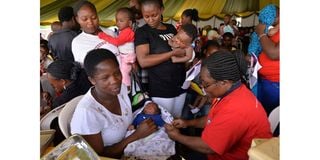Kemri develops biometric vaccination tool for newborns

Kemri and her partners have developed a digital biometric-based vaccination system for newborn children in the country.
The Kenya Medical Research Institute (Kemri) and her partners have developed a digital biometric-based vaccination management system for newborn children in the country.
They explain that their new tool comes as many children around the world continue to lose their lives at a very young age due to lack of vaccination.
In 2020 alone, approximately five million children died before reaching their fifth birthday, even without taking into account the impact of Covid-19 while about half of these children under the age of five, or 2.4 million children, passed away within 28 days of birth, with many of these deaths considered preventable according to Kemri.
According to Kemri scientists, the new technology combines fingerprint identification for children and voice recognition for caregivers to confirm not only their identity, but also to reliably manage vaccination histories and schedules, thereby promoting the implementation of appropriate vaccinations for newborns and children during the first 24 months of life.
Going forward, demonstration tests that network among multiple hospitals will begin, aiming for full-scale introduction throughout Kenya by the end of 2023, and more international deployment in the future.
“Since voice recognition can be performed almost instantaneously, this system can minimise the burden placed on caregivers. Medical institutions can also introduce voice recognition with little to no change to existing procedures'" Kemri and her partners NEC Corporation and Nagasaki University explained in an official release.
" Rather than using conventional fingerprint authentication methods to identify newborns, researchers developed a new method with which fingerprint pattern information is extracted from fingerprint images and a newborn child can be identified by combining fingerprint pattern data from multiple fingers," the statement adds.
“We are excited that Kemri together with its partners, are spearheading this landmark study that identifies newborns using a biometric and a vaccination management system that is not only in real time, but is also expected to support policy and action towards the attainment of better health outcomes and Universal Health Coverage. I am happy to announce that this tool will be validated by Kemri researchers in partnership with Kinango sub-county Hospital in Kwale, NEC Corporation and Nagasaki University," said Prof Sam Kariuki who is the Acting Director General, Kemri.
While highlighting that the initial results are very encouraging, Kemri said that the validation of this system is currently taking place with a clinical trial that began in September last year at the Kinango Sub-County Hospital.
This technology marks the first time that biometric identification is being used at a hospital to identify newborn children at the time of vaccination, including those immediately after delivery and as of November 2022, data from more than 300 caregivers and newborns had been registered, including the vaccination histories of more than 150 newborns,” Kemri said.
Kemri scientists further disclosed that their clinical trials involved approximately 1,000 caregivers and newborns with trial data being registered for approximately 300 individuals as of the end of November 2022.
“Using the vaccination management system, the hospital records information on the physical characteristics of newborns at the time of birth as well as the history of and schedule for administration of eight different vaccines and one vitamin supplement up to 24 months after birth to verify the effectiveness of and issues related to the system. The voice and fingerprint pattern data acquired will be used only for the current purpose of this trial and will be deleted after its completion,” the scientists added.
Prof Miriam Khamadi Were who is a 1st Hideyo Noguchi Africa Prize Laureate, is encouraged.
“I expect that this vaccination management system, including newborn fingerprint biometric technology, will expand the coverage of vaccinations for children under 24 months old through accurate identification methods for mothers and children in Kenya," she said.
"I also express great expectations for this research to act as a guideline for precise vaccination management featuring newborn and caregiver identification to become an important contributor to Universal Health Coverage,"she added.
These efforts to increase vaccination coverage support Sustainable Development Goals (SDG) 3.2, "By 2030, end preventable deaths of newborns and children under 5 years of age, with all countries aiming to reduce neonatal mortality to at least as low as 12 per 1,000 live births and under-5 mortalities to at least as low as 25 per 1,000 live births."
No vaccinations
The efforts also contribute to the realisation of SDG 16.9, "By 2030, provide legal identity for all, including birth registration," by providing all newborns with a record of parent-child relationships and birth location information, as well as a means of identification.
Last month, the Kenya Demographic and Health Survey (KDHS) 2022 released by the Kenya National Bureau of Statistics showed that in the country, two percent of children age 12–23 months have received no vaccinations
“At the county level, Vihiga has the highest percentage of children age 12-23 months who are fully vaccinated for basic antigens (96 percent) while Garissa has the lowest (23 percent).”





